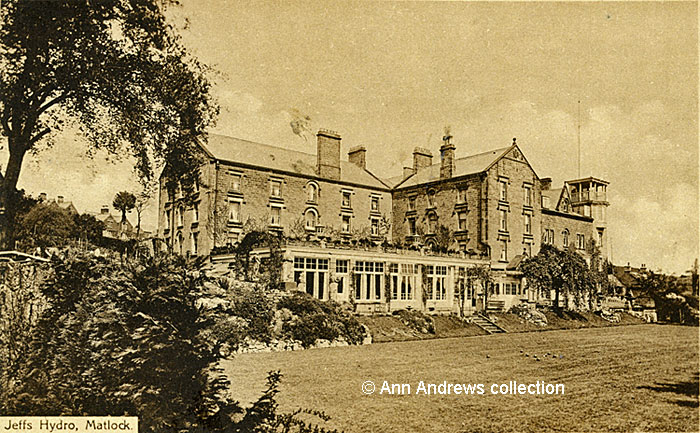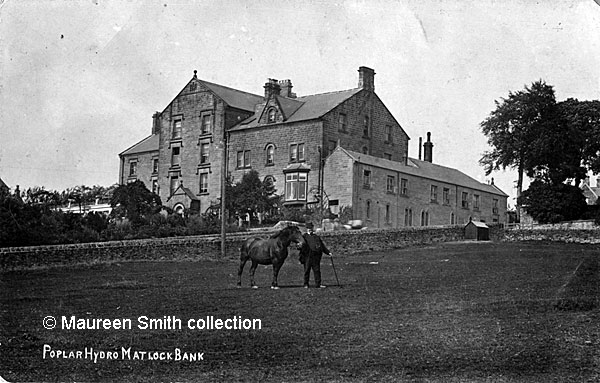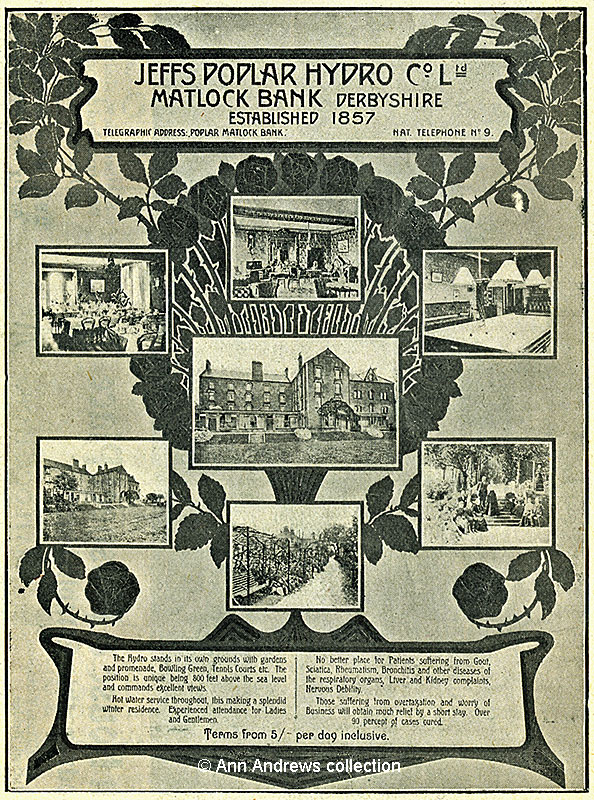|
Images Index> Matlock, 20th and 21stC Images> This page |
| Matlock: Poplar Cottage & Jeffs' Poplar Hydro (Chatsworth Hydro), 1857-1912 |
| Matlock : Twentieth Century Photographs, Postcards, Engravings & Etchings |
|
||||||||||||||||||||
We learn more of the early history of Poplar Cottage because of a dispute in the Chancery Division of the High Court of Justice in 1892. The case had begun some time before, when Thomas Davis brought an action in the County Court against the local Water Company. Thomas had died in the interim, on 26 July 1891 aged 79, so the revived action was brought by his sons and executors who were the plaintiffs[2]. Ralph Davis, a brother of Thomas, had opened Poplar Cottage as an hydropathic establishment in 1857. It was said that there were "three classes of patients. First, those who resided in Poplar Cottage; second, out-patients, residing Matlock; and thirdly, strangers who visited Matlock to be treated, but did not lodge at Poplar Cottage". He also treated patients at Southview (later the Memorial Hospital). Ralph's success at Poplar Cottage was attributed to the fact that there was a particularly abundant supply of water, flowing from an old spring (the Wold Spring). This stream divided into two, one arm of which supplied troughs at Poplar Cottage. Two pipes supplied the kitchen (for domestic purposes) and the bathroom (for business purposes) and Poplar Cottage enjoyed a free water supply. Indeed, the domestic supply had existed since 1790 but when the Matlock Waterworks Company was formed in 1860 the water was diverted into a reservoir[2].
The house returned to Davis family ownership when Thomas Davis bought Poplar Cottage for £900 from Knowles in 1874, paying £400 more than Knowles had paid for it because the water was free. Unfortunately, there were complaints in both 1876 and 1877 about an insufficient supply, so the ¾" pipe was replaced by one with a diameter of an inch. Then in 1882 it was found that the force of the water in the Chesterfield Road main was so great that the water rushed past the Poplar Cottage pipes; this fault was remedied by putting a stop cock in the main. In 1879 Thomas Davis was invited to a meeting with the Water Company's secretary to agree a charge; he took no notice of the invitation[2]. Poplar Cottage was enlarged because the business increased, and more sleeping accommodation was needed. Thomas continued to run the hydro until his death. His son Jesse (Aaron Josiah) succeeded him and the business continued in the three ways begun by his uncle Ralph. The ongoing dispute about how the house was supplied with water eventually reached the County Court and progressed to the High Court. One issue was that some people were staying at Prospect Place, Thomas Davis's other establishment, but they had bathed at Poplar Cottage since 1879. There were also customers from within the parish and excursionists who visited Matlock for the day. So non-residents were using the water without paying for it. A compromise was reached and judgment was given to the plaintiff[2]. A new wing has been added - thirty bedrooms,
a large drawing room and a billiard room - so a rearing [sic]
dinner to celebrate was held at the Queen's Head in July 1892[3].
At the beginning of the twentieth century there were numerous advertisements for Jeffs' Poplar Hydro published in Yorkshire newspapers. In 1902 it was said that the hydro "Stands in its own ground, with Gardens, Bowling Green, etc. and commands excellent views. Hot Water Services throughout, making it a splendid winter resort. No better place for persons suffering from Gout, Sciatica, Rheumatism, Bronchitis, and Diseases of the Liver, Kidneys or Respiratory Organs (over 80 per cent of cases cured)". The terms were then 5s. per day[8].
Later the same year Jeffs, clearly an opportunist, was to write a letter to J. D. Rockefeller of New York as the American businessman and philanthropist had offered $1.5million for someone to cure his dyspepsia. Jeffs suggested that Rockefeller should visit as his hydro had already cured thousands suffering with the same problem. No rejection letter was published in the British press but, equally, no acceptance was published either[10].
Jeffs' Poplar Hydro was not as successful as its owner had hoped, got into difficulties and was sold in 1912"[17]. The new owners changed the name to Chatsworth Hydro[18].
Photos of the Hydro Staff in the Hydros and Convalescing section of the Vernon Lamb Archive:
|
||||||||||||||||||||
|
1. "Jeffs Hydro, Matlock". Published by Jackson & Son (Gy.), Ltd, Grimsby, Jay Em Jay Series. Posted 6 May 1912 at Matlock. In the collection of, provided by and © Ann Andrews. 2. "Poplar Hydro, Matlock Bank", no publisher. In the collection of, provided by and © Maureen Smith collection. 3. Advertisement from "Abel Heywood's Guide Books ... " (see notes below) © Ann Andrews collection.[11] 4. Advertisement from Ward Lock & Co's Guide ... (1911-12)[16]. Researched and written by and © Ann Andrews. Intended for personal use only. |
||||||||||||||||||||
References (coloured links to onsite information): [1] Information from Ray Ash. Also see the 1891 census when Josiah Davis was at Poplar Cottage and "Kelly's 1891 Directory" listing Davis Thomas & Sons, hydropathic establishment, Prospect House & Poplar Cottage. The same entry was in "Kelly's Directory 1895 "; the entry in "Kelly's 1899 Directory" was for Thos Davies & Sons and was just Poplar Cottage. Thomas Davis advertised in "Days in Derbyshire" (1863) by Spencer Timothy Hall. Hall also mentions the Davis brothers in Chapter 5. [2] "Derbyshire Times",12 November 1892. A Matlock Hydro and its Water Rights. Davis v. Matlock Water Works Company Limited. Judgment for the Plaintiff. The case began on 8th November 1892. [3] "Derbyshire Times", 9 July 1892. Matlock Bridge. The Cottage Hydro. [4] "Derbyshire Times",15 February 1896. Death of Mr. A. J. Davis, of Matlock.Also "Derbyshire Times", [4] "Derbyshire Times and Chesterfield Herald", 5 December 1896. The couple were married at All Saints' and the reception was held at Poplar Cottage. [6] "Sheffield Independent", Thursday 15 November 1900. The notice of distribution to the creditors of Thomas Davis and Sons and George Davis was published in "The London Gazette" on 28 February 1902. [7] Ruth was living at the Poplar Hydro at the time of the 1901 census. She was living on Cavendish Road, with her son, when she passed away on 16 November 1910. [8] "Hull Daily Mail", Thursday 3 April 1902. Jeffs Poplar Hydro, Matlock Bank. [9] "Sheffield Daily Telegraph", 9 February 1903. Jeffs' Poplar Hydro Company, Matlock. [10] "Derbyshire Times", 18 July 1903. [11] "Abel Heywood's Guide Books, With Cycling, Walking and Driving Routes. Matlock Illustrated." (1903) Abel Heywood & Son, Manchester & London. [12] "Derbyshire Advertiser and Journal", 26 July 1907. [13] On
census night in 1901 Grimsby Town football team were staying at Poplar
Hydro; Mary Williams was the manageress. She afterwards went
to Sycamore House on Smedley Street but the partnership was dissolved
("Sheffield Daily Telegraph" 11 July 1906). [14] "Sheffield Daily Telegraph", 16 August 1909. She had been there for a number of years when she departed in 1909; she was also given an illuminated address. [15] "Derbyshire Advertiser and Journal", 6 January 1912. Matlock Hydro Revels. The role reversal had become a tradition at Matlocks hydros. [16] Advertisement from Ward Lock & Co's "Matlock, Dovedale, Bakewell and South Derbyshire", Illustrated Guide Books of England and Wales (1911-12). [17] "The London Gazette", 17 September 1912 (notice of sale of this property). The company had failed in 1911. [18] "Kelly's Directory, 1925" gives
the name as Chatsworth
Hydro but newspaper reports show the property
had been Chatsworth Hydro from 1913 onwards. |













 Advertisement
from Ward Lock's 1911-12 Guide
Advertisement
from Ward Lock's 1911-12 Guide







 Matlock
Bank Primitive Methodist Church, 'Young Mens' Class
Matlock
Bank Primitive Methodist Church, 'Young Mens' Class